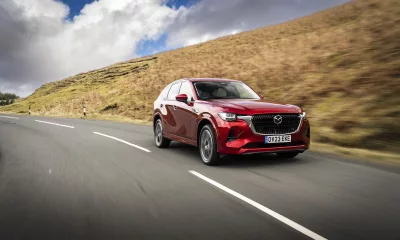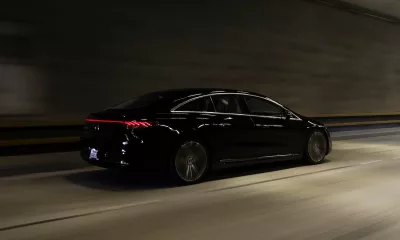

The GTI TCR is a fitting farewell to a generation of the Volkswagen Golf that has consistently impressed since its launch, seven years ago…
Consistently impressive as it’s been, the seventh-generation Volkswagen Golf’s time is slowly coming to an end as we anticipate the arrival of the new model in the second quarter of 2021. As a means to say farewell to a car that hasn’t faltered since it was introduced here in 2013, we’ve been given the opportunity to test the GTI TCR; a special-edition model to commemorate VW’s participation in the FIA Touring Car Racing International Series.
Much like the Clubsport we tested in July 2016, the TCR builds upon the already impressive GTI package by adding more power, tuning the chassis and lathering it with TCR paraphernalia. Externally, the exclusive hot hatch sports unique TCR graphics and badging, a lip on the front and rear bumper that’s linked by a pair of side skirts, matte black mirror caps and 19-inch Reifnitz alloy wheels. Visually, the hot hatch makes for a pleasant centrepiece in the driveway, especially in this Pure Grey finish with the black aero parts, wheels and TCR decals. It’s not too aggressive in its styling but still translates a distinctive performance persona. For some, the honeycomb decal pack may be too gaudy, though.
The cabin’s styling and layout are similar to that of the GTI; the leather, cloth and Alcantara-finished TCR bucket seats are probably the most prominent change. Other TCR touches – such as an active info display, Alcantara door inserts, unique floor mats and a plaque bearing the individual production number on the dash – are more restrained. As expected, perceived quality is class leading with trim materials ranging from soft-touch plastics to piano-gloss finishes. The solid-feeling switchgear reinforces the TCR’s premium placement.
Pleasing as they are, these particular TCR touches are merely skin-deep, with the biggest changes to be found in the engine bay. The EA888 turbocharged 2,0-litre four-pot has been tuned to produce 213 kW and 380 N.m of torque – the same as the Golf R prior to its 2019 standardisation to 228 kW – upping the top speed to 264 km/h. Like the R, it gets a six-speed dual-clutch transmission and, thanks to several weight-saving measures, this model is 35 kg lighter than the GTI.
Where the TCR shines is in its chassis setup, tuned to be stiff on the front axle and less so on the rear to create intense but playful driving dynamics. To achieve this, Volkswagen lowered the ride by 20 mm and increased camber on the front axle by three degrees (maintaining negative camber both front and rear). Dynamic control is fitted as standard to bring out the best in this chassis, together with an electronic limited-slip differential on the front axle and a more responsive steering system.
This translates to a thrilling hot hatch that provides near-endless grip up front and a bit of play at the rear, making it a treat to throw through tight and sweeping corners. On a twisting mountain pass, the TCR is exhilarating thanks to its responsive engine, precise steering and quick-shifting transmission. While its lack of a mechanical front differential may imply it’s not as focused as the Honda Civic Type R and Renault Mégane RS 300 Trophy, the TCR makes easy work of intricate corners while those sculpted seats grip you in place.
Despite its stiffened chassis, the TCR is a comfortable daily driver; the Dynamic Chassis Control system’s measured damping irons out most road imperfections. NVH is also impressive as road and wind noise are fairly hushed, even at motorway speeds. The engine note is ever present but thankfully, it’s authentic and isn’t pumped into the cabin through the speakers. Crackles and pops from the exhaust system are also evident when lifting off the throttle in Race mode. The uprated powertrain, in conjunction with the quickfire six-speed dual-clutch, gives it a formidable turn of pace.
Our 0-100 km/h acceleration tests saw us achieve a time of 5,82 seconds; admittedly 0,24 seconds slower than claimed, but still very impressive. This figure was not easily attained, though. We encountered a large amount of jarring axle tramp and had to frequently contend with a launch control system that struggled to smoothly regulate power to the front wheels. Consequently, hard acceleration from a standstill felt as though it was punishing the drivetrain and wheelspin was excessive until third gear.
Once on the go, the TCR’s performance vastly improves, as it displays strong in-gear acceleration from 40-100 km/h; takes just 2,02 seconds from 100-120 km/h; and the four-pot starts to run out of puff only much higher in the rev range, as evidenced by its 120-140 km/h time of 2,61. Next to its closest competitor – the Renault Mégane RS 280 Lux we tested in October 2018 – its in-gear acceleration is a fraction slower but it trims 0,27 seconds off the French car’s 0-100 km/h sprint time.
The uprated braking system serves up excellent stopping performance with an average 100-0 km/h time of 2,71 seconds. With the worst of the 10 stops taking 2,73 seconds, there’s an impressive consistency in its stopping power. Compared to the standard GTI (tested in August 2017), it comes to a halt 0,12 seconds faster on average.
Our fuel-route test saw the TCR return 8,60 L/100 km against the CAR fuel index figure of 9,00 L/100 km, which is modest for a turbocharged 2,0-litre engine producing this much power. In fact, it’s 0,1 L/100 km less than the turbocharged 1,8-litre Mégane RS 280 Lux’s result.
Bearing in mind the TCR boasts a fairly competitive price tag, the list of standard features lacks keyless entry, a rear-facing camera and satellite navigation and, unlike the standard GTI, these are not available as optional packages. The infotainment system does accommodate Apple Car Play and Android Auto for those who use their mobile map software. Putting this aside, it is generously specced if you consider the digital dash, heated seats and dual-zone climate control. A total of 300 units have been allotted to the South African market.
TEST SUMMARY
From the 1,0-litre Comfortline to the hard-edged Clubsport S (see our June 2017 test), the seventh-generation Golf has completely blown us away in every variation since we first tested it in 2013, often setting benchmarks for C-segment hatchback refinement and performance.
Although the TCR isn’t the most thrilling of the bunch we’ve sampled (that accolade undoubtedly goes to the Clubsport S), it’s by no means far off. It’s a fitting last hurrah for a car that has conquered its segment on a global scale. It offers comfortable daily usability that is aesthetically pleasing both inside and out; effortlessly ticking every box on the list. The eighth-generation Golf has some mighty boots to fill.
ROAD-TEST SCORE: Four stars
Buy a VW Golf Gti on South Africa’s most trusted car marketplace.
Golf Gti for sale
Used Golf Gti for sale
Gti for sale in western cape
Gti for sale in cape town
Gti for sale in johannesburg
Gti for sale in kwazulu natal
Gti for sale in eastern cape




